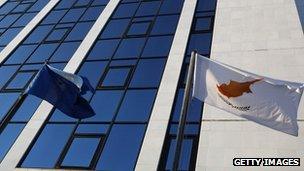Cyprus makes progress over rescue deal with creditors
- Published

Further progress has been made towards a rescue deal for Cyprus, the European Union and the International Monetary Fund have said.
A Cyprus government spokesman had earlier said that a deal had been clinched and would be made official later on Friday.
But the IMF and EU stopped short of a final statement, saying that "good progress" had been made.
Cyprus asked for help for its stricken banks in June.
Banks have suffered losses due to their heavy exposure to neighbouring Greece via financial and trade links.
"Discussions are expected to continue from respective headquarters with a view to making further progress toward a potential program," said a statement by the troika of international authorities - the European Commission, European Central Bank and the IMF.
The deal is expected to include 17.5bn euros (£14bn; $23bn) of loans - the equivalent of the country's entire annual economic output - but it would have to be ratified by parliaments in the eurozone countries.
'Massacre'
The troika statement said officials were still ironing out details with Cypriot counterparts on key policies to strengthen public finances, restore the health of banks and overhaul the country's competitiveness.
Initial results of a series of independent stress tests on banks to evaluate their strength in disaster scenarios will be unveiled in the next few weeks, it added.
Earlier, government spokesman Stefanos Stefanou said: "The deadline that was set by the European Central Bank for the recapitalisation of the banks expired, so we had to enter the rescue mechanism".
The government said it had already discussed the deal with trade unions, Mr Stefanou said, adding: "The bailout deal includes unpleasant measures."
Glafkos Hatzipetrou, a senior official of public sector union PASIDY, who was briefed about the deal said: "These measures are unjust, they will be a massacre."
Banks have lost large amounts on the money they lent to the Greek government by buying its bonds. They are also facing big losses on loans made to businesses in Cyprus, which have been hit by the deep recession in neighbouring Greece, its biggest trading partner.
Banking debt
In total, Cypriot banks have outstanding loans or other money at risk totalling 152bn euros, or eight times the size of the country's gross domestic product, according to the IMF.
Bank exposure to Greece totals €29 billion, or 160 percent of GDP, including both Greek government bonds and loans to Greek residents.
In June the country's two largest lenders the Bank of Cyprus and Cyprus Popular Bank had asked for more than 2bn euros in government aid.
Fitch on Friday slashed further its credit rating on both banks as well as Hellenic Bank to Bb- from Bb, meaning their bonds are now junk grade and in danger of default.
The downgrades are based on a "high level of uncertainty over the costs associated with the overall banking system's recapitalisation," Fitch said in a statement, although it added that the likelihood that they would get state support remained strong given their "systemic importance" in the domestic economy.
Cyprus has been unable to borrow from international markets for over a year because credit rating agencies lowered its sovereign rating to junk status.
The Cypriot government has also been holding negotiations for a possible loan from a country outside the EU, such as Russia or China.
The country has already borrowed 2.5bn euros from Russia, whose business people are important customers of Cyprus's relatively large offshore financial sector which offers low tax rates.
Cyprus is the fifth country in the 17-member euro area to accept external emergency assistance.
Greece, Ireland, Portugal, and Spain have asked for bailouts, although Spain's banking rescue was funded by the eurozone's European Financial Stability Facility.